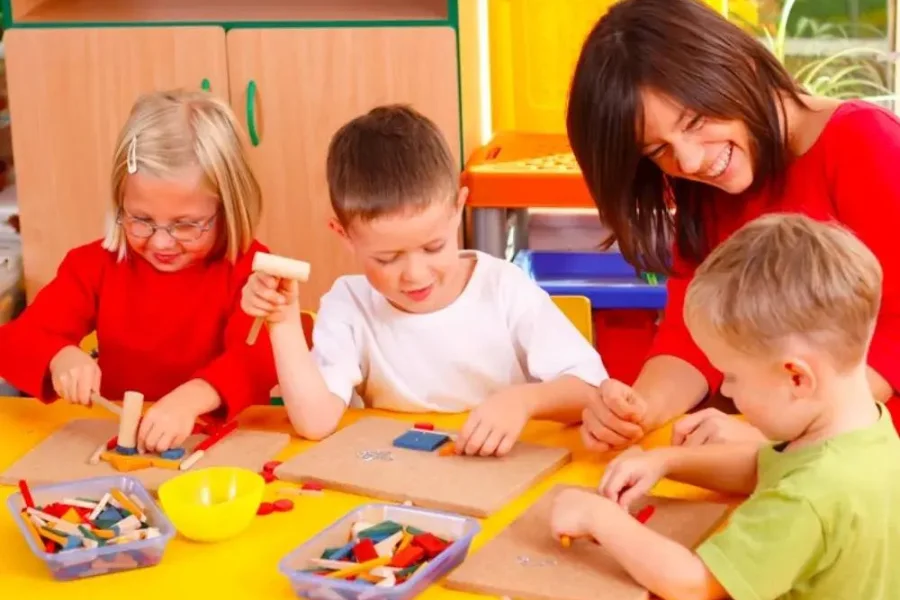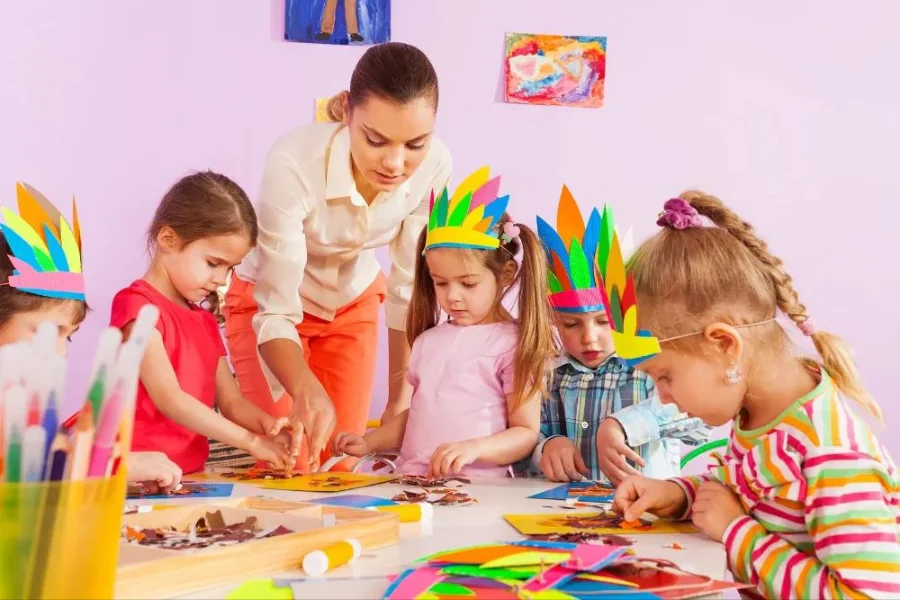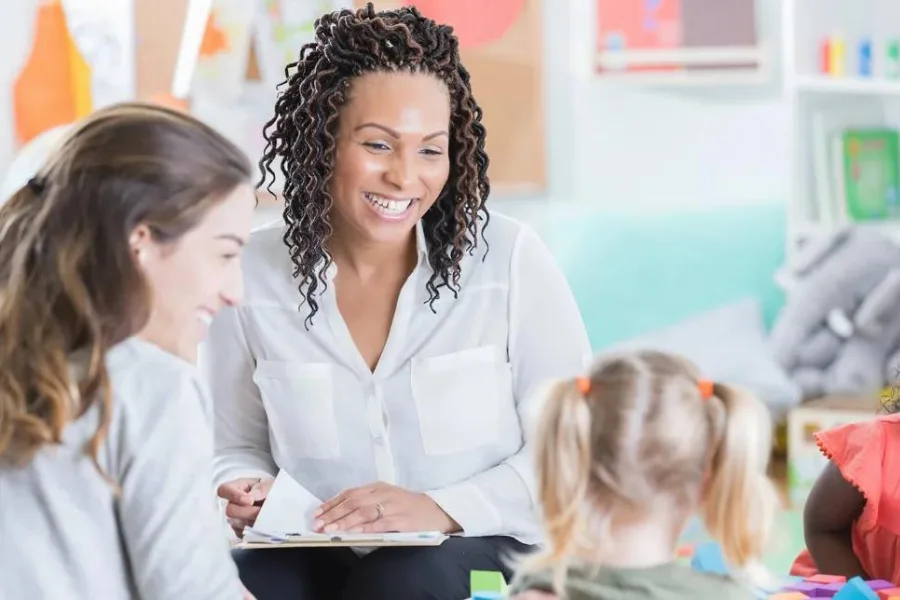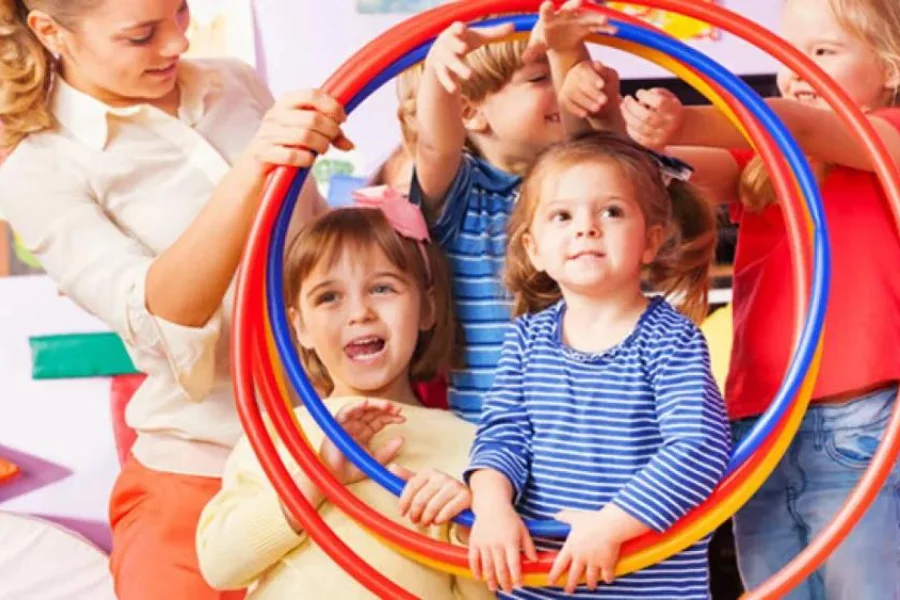How to Teach LKG and UKG Students?
How to Teach LKG and UKG Students?

Source: ser4kids
Teaching LKG and UKG students is both a delightful and challenging journey. In early education, understanding the nuances of ‘How to Teach LKG and UKG Students?’ is key to unlocking the potential of these young minds.
How to Teach LKG and UKG Students is about finding the right balance between learning and play. It’s crucial to keep lessons engaging, interactive, and suited to their level of understanding. Remember, the goal is to instill a lifelong love for learning, not just to impart knowledge. With the right approach, teaching LKG students can be an incredibly rewarding experience.
To teach LKG and UKG Students, take up a course in Nursery teaching or ECCED from Vidhyanidhi Education Society-VES, which is a govt. regd. teachers training institute guiding aspiring teachers for more than 15 years. From interactive learning methods to fostering a nurturing environment, VES makes teaching at this level both unique and rewarding.
Table of Content
- Understanding Child Development
- Creating a Stimulating Environment
- Incorporating Play-Based Learning
- Building Basic Skills
- Fostering Social and Emotional Development
- Incorporating Technology Wisely
- Regular Communication with Parents
- Personalized Attention
- Creative and Experiential Learning
- Continuous Professional Development for Educators
- What Should I Teach for LKG Students?
- Fun Activities for LKG and UKG
- How Can I Make Learning Fun For Kindergarten?

Source: proeves
Understanding Child Development
Recognize Developmental Milestones
Children aged 4-6 undergo critical developments in language, cognitive skills, and motor abilities. Understanding these milestones helps in creating age-appropriate learning experiences.
Tailor Learning Approaches
Each child is unique. Some may grasp concepts quickly, while others need more time. Tailoring approaches to individual needs ensures no child is left behind.
Creating a Stimulating Environment
Interactive and Engaging Classrooms
Use visual aids, thematic decorations, and sensory play materials to create a vibrant learning atmosphere. This stimulates curiosity and supports various learning styles.
Safety and Comfort
The environment must be not only engaging but also safe and nurturing. A comfortable setting helps children to relax and engage more fully in learning activities.
Incorporating Play-Based Learning
Learning through Play
Embrace activities like storytelling, puppet shows, and educational games. Play-based learning enhances cognitive and social skills while keeping the children engaged.
Balance between Structure and Freedom
While maintaining a structured approach to certain activities, it’s equally important to allow free play. This balance aids in fostering independence and creativity.
Building Basic Skills
Introduction to Alphabet and Numbers
Use creative methods like songs, interactive digital media, and picture books to introduce these basic concepts enjoyably.
Enhancing Fine Motor Skills
Activities such as clay modeling, beading, or using building blocks are not only fun but also crucial in developing fine motor skills and hand-eye coordination.

Source: ltkcdn
For in-depth course info, dial +919869866277 / +919869546913.
Grab the LKG & UKG Course brochure by Clicking Here.
Fostering Social and Emotional Development
Group Activities for Social Skills
Encourage participation in group activities to develop skills like teamwork, patience, and sharing. Role-playing and group projects can be particularly effective.
Emotional Intelligence
Teach them to recognize and express emotions healthily. This can be achieved through storytelling, puppetry, and discussions about feelings.
Incorporating Technology Wisely
Educational Technology as a Tool
Smart use of technology, like interactive educational apps and age-appropriate computer games, can enhance learning experiences.
Limiting Screen Time
It’s crucial to find the right balance between digital and traditional learning to ensure overall development and avoid over-reliance on screens.
Regular Communication with Parents
Active Parental Involvement
Keep parents informed about their child’s progress and involve them in educational activities. Parent-teacher meetings and regular updates can bridge the gap between home and school learning.
Home-School Synergy
Provide parents with tips and activities that can be done at home, reinforcing what is taught in the classroom and promoting continuous learning.
Personalized Attention
Understanding Individual Learning Styles
Acknowledge that each child learns differently. Some may be visual learners, while others might prefer hands-on activities.
Positive Reinforcement Techniques
Employ methods like praise, reward systems, and encouragement to foster a positive learning environment and boost self-esteem.
Creative and Experiential Learning
Arts, Crafts, and Music
Engage children in creative activities like painting, music, and dance. These activities encourage self-expression and enhance artistic talents.
Field Trips and Real-World Learning
Organize educational trips to places like zoos, museums, and botanical gardens. These experiences provide practical knowledge and a break from the regular classroom setting.
Continuous Professional Development for Educators
Stay Updated with Educational Trends:
Regularly attend workshops, webinars, and conferences. Being abreast of the latest educational trends is crucial for effective teaching.
Reflective Teaching Practices
Continuously reflect on and adapt teaching methodologies. Feedback from peers, parents, and even children can be invaluable.
Teaching LKG and UKG students is more than imparting knowledge; it’s about inspiring a love for learning, fostering creativity, and nurturing emotional and social well-being. By adopting these enhanced strategies, educators can create a dynamic, inclusive, and enriching environment that supports the holistic development of young learners, paving the way for future academic and personal success.
For in-depth course info, dial +919869866277 / +919869546913.
Grab the LKG & UKG Course brochure by Clicking Here.
What Should I Teach for LKG Students?
Lower Kindergarten, or LKG, marks a significant step in a child’s educational journey. It’s a time when kids are bursting with curiosity and ready to absorb new concepts like sponges. Teaching LKG students requires a blend of patience, creativity, and a deep understanding of their developmental stage.
Basic Literacy Skills
- Alphabets and Phonics: Begin with teaching the alphabet, both uppercase and lowercase letters. Introduce phonics to help them understand the sounds each letter makes.
- Simple Words: Start with easy three-letter words, using phonics to blend sounds.
- Reading Skills: Encourage reading through picture books and simple sentences, assisting them in recognizing words and understanding storylines.
Numeracy Skills
- Number Recognition: Teach numbers initially up to 10 and then gradually increase to 20 or higher, depending on the child’s grasp.
- Basic Counting: Use physical objects for counting exercises to make learning tangible.
- Simple Math Concepts: Introduce basic concepts like addition and subtraction using practical examples and interactive games.
Motor Skills Development
- Fine Motor Skills: Activities like coloring, cutting with safety scissors, and playing with clay can enhance fine motor skills.
- Gross Motor Skills: Encourage physical activities like jumping, running, and balancing to develop gross motor skills.
Environmental Awareness
- Basic Concepts: Introduce them to different colors, shapes, animals, and plants in their environment.
- Sensory Activities: Use sensory play to help them explore and understand the world around them.
Social Skills
- Sharing and Cooperation: Group activities where children need to share and work together can be very beneficial.
- Understanding Emotions: Teach them about different emotions and appropriate ways to express them.
Language Skills
- Oral Communication: Engage in conversations, storytelling, and rhymes to enhance their speaking and listening skills.
- Introduction to a Second Language: If applicable, LKG can be a great time to introduce a second language in a fun and interactive way.

Source: greatbegninngs
For in-depth course info, dial +919869866277 / +919869546913.
Grab the LKG & UKG Course brochure by Clicking Here.
Fun Activities for LKG and UKG
Children aged between 2-5 years are extremely innovative, creative, and eager to know and learn things. Therefore. kindergarten teachers are the ones who extract the best out of the kids by creating and implementing amusing and entertaining fun activities for LKG and UKG with enthralling environments.
Here are some exciting activities that can be incorporated into the daily routine to teach LKG and UKG students:
Storytelling Sessions
Storytelling is a powerful tool in early education. It enhances listening skills, boosts imagination, and introduces new vocabulary. Teachers can organize storytelling sessions where children sit in a circle and listen to a story. To make it more interactive, teachers can use puppets and props, or even involve children in acting out parts of the story.
Nature Walks and Exploration
Children are naturally drawn to the outdoors. Organizing short nature walks in a safe area can be highly beneficial. During these walks, children can collect leaves, stones, or flowers and learn about them. This activity encourages observation skills and a love for nature.
Arts and Crafts
Arts and crafts stimulate creativity and fine motor skills. Simple activities like coloring, cutting, pasting, or clay modeling are not only enjoyable but also help in developing hand-eye coordination. Teachers can introduce themes related to seasons, festivals, or animals to make the activities more structured.
Puzzle Solving and Building Blocks
Puzzles and building blocks are excellent for developing cognitive skills and problem-solving abilities. These activities can be individual and group tasks, promoting teamwork and social skills among children.
Music and Dance
Integrating music and dance into the curriculum can be highly beneficial. It aids in the development of auditory skills and rhythm sense. Children can be taught simple songs and dances, which also help in improving their memory and coordination.
Educational Games
Games that involve counting, and identifying colors, shapes, and letters are perfect for this age group. Such games make learning fun and interactive, and they can be played in groups, encouraging social interaction and teamwork.
Role-playing and Drama
Role-playing and drama activities are great for fostering imagination and verbal skills. Children can enact simple stories or scenarios, which helps in building confidence and expressiveness.
Science Experiments
Simple science experiments, which are safe and easy to understand, can be conducted to spark curiosity. Activities like mixing colors, observing plants grow, or floating and sinking experiments enjoyably introduce basic scientific concepts.
Language Games
Language games like rhyming words, picture-word association, or simple word puzzles help in developing language and literacy skills.
Yoga and Physical Activities
Incorporating yoga or simple physical exercises into the daily routine can improve physical health and mindfulness. Activities like stretching, balancing, or group sports also encourage a healthy lifestyle from a young age.
The goal of these activities is not just to keep the children occupied, but to stimulate their curiosity, enhance their learning, and help them develop a range of skills in a fun and supportive environment. The key is to keep the activities varied and suited to the children’s interests and developmental stages. With the right mix of fun and learning, LKG and UKG can be a memorable and foundational phase in a child’s educational journey.
For in-depth course info, dial +919869866277 / +919869546913.
Grab the LKG & UKG Course brochure by Clicking Here.
How can I make Learning Fun for Kindergarten?
The kindergarten years are a time of boundless curiosity and joy in discovery. As educators, parents, or guardians, it’s our delightful challenge to harness this natural enthusiasm and turn the learning experience into an adventure.
Make Learning Fun for Kindergarten with below-mentioned activities:
Embrace Playful Learning
Play is the language of children. Incorporating play into educational activities is key. This can be as simple as using educational toys, games, and puzzles that promote problem-solving and critical thinking in a fun way.
Create a Colourful and Engaging Environment
A stimulating environment sparks curiosity. Use bright colors, interesting shapes, and various textures in your classroom or learning space. Wall decorations, like alphabet posters or nature scenes, can be both educational and visually appealing.
Storytelling and Puppet Shows
Stories capture imaginations. Utilize storytelling to teach lessons or introduce new concepts. Puppet shows can also be a fantastic way to engage children, allowing them to learn through characters they can relate to and adore.
Interactive and Hands-On Activities
Learning by doing is powerful. Activities like gardening, cooking simple recipes, or arts and crafts projects allow children to learn through experience. This hands-on approach caters to various learning styles and keeps children actively engaged.
Incorporate Music and Dance
Music and movement are universal joys. Use songs to teach concepts like numbers, letters, or social skills. Dance and movement activities not only make learning fun but also help in developing motor skills.
Technology Integration
Make technology your ally. Educational apps and interactive games can be great tools for making learning exciting. They offer a blend of visual, auditory, and kinesthetic learning experiences.
Regular Outdoor Excursions
Nature is the best classroom. Regular trips to parks, zoos, or botanical gardens can stimulate curiosity about the natural world. These excursions can be tied back to lessons in science, geography, or environmental education.
Foster a Culture of Encouragement
Celebrate every achievement. Positive reinforcement and encouragement can boost a child’s confidence and interest in learning.
How to Teach LKG and UKG Students
“Join VES for a magical LKG & UKG learning adventure!”
For in-depth course info, dial +919869866277 / +919869546913.
Grab the LKG & UKG Course brochure by Clicking Here.
FAQs
What is the Full form of LKG?
LKG stands for Lower Kindergarten, a foundational educational stage for young children around 4-5 years old.
How do you teach a LKG student to write?
Teaching LKG students to write involves fun tracing activities, drawing simple shapes, and encouraging grip practice with chunky pencils.
What should I teach to UKG students?
For UKG students, focus on basic math skills, language development, environmental awareness, and creative activities like storytelling and art.
Is preschool and LKG same?
Preschool is a general term for early childhood education, while LKG specifically refers to the year before Upper Kindergarten (UKG).




